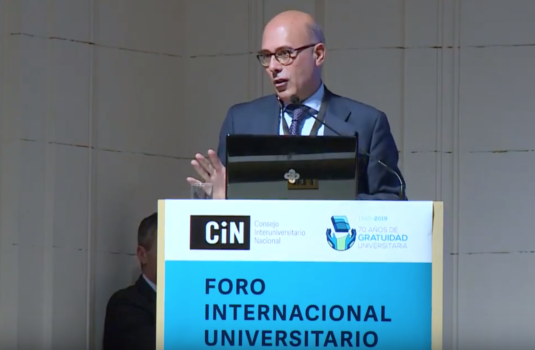Towards #WHEC2022. Webinar 3: Higher education governance
One of the main axes of the UNESCO World Higher Education Conference #WHEC2022 , to be held in Barcelona (Spain) next May, is governance. In order to transfer the approaches of Latin America and the Caribbean, IESALC is carrying out a specific Regional Consultation, through a variety of events in order to bring together as many voices from different sectors as possible.
On this occasion, on December 15, 2021, experts in the area participated in this webinar -organized jointly with the IDB, OEI, Santander Universities and SEGIB- to reflect on governance in higher education.
–Moderator: Victoria Galán-Muros, Head of Research and Analysis, UNESCO IESALC
Some ideas from the speakers

-Francesc Pedró, Director of UNESCO IESALC
At UNESCO IESALC, we defend the key role that governments and the State have to play in safeguarding the right to higher education, even more so in a context of crisis; and at the same time we also want to reiterate the importance of the autonomy of higher education institutions, particularly universities.
What makes them so special is precisely that they are institutions that work, not only in training, but also in the generation of knowledge. Indeed, this autonomy must be guaranteed in order for universities to achieve their objectives, through self-organization, to find internal governance formulas that stimulate this dual function.

-José Joaquín Brunner, Head of the UNESCO Chair in Comparative Higher Education Policy
I begin by reviewing the new contexts in which education is developing in Latin America. It is in relation to these contexts that the governance of national systems is being transformed in significant dimensions; this, in turn, leads the governments of institutions to adapt.
We have had an explosion in enrollment that continues to grow. In the last half century we have gone through the 3 great stages: from elite education, then to a stage of wide-spread growth, which has led us to a phase of gradual universalization of higher education.
We have very complex systems from the point of view of the composition, not only of the students who enter; we also have a great diversity of institutions (university and non-university, state and private).
In the region, 4 million students graduate each year, with the purpose of joining the productive sector; hence their employability is a challenge. And despite the fact that the number of publications has doubled in the last decade, increasing research and knowledge production is also a challenge.
On one hand, the new governance of the system and institutions is developing incrementally and adaptively to cope with changes in the environment, and on the other, due to the strategic game of stakeholders within the political-institutional environment of each country. The models or paradigms that circulate internationally, which are processed and applied in the region, also have an impact.
At the system level, governance faces the continuous challenge of maintaining and developing HE and systemic coordination by integrating the State, universities and markets, together with the trust expected by society and public opinion. Internally, HEIs seek to adapt to the changing governance configurations of the system.
In systemic governance trends, there has been a broad discussion about the institutional framework and the generation of legislation; it involves numerous levels and multiple actors, and it includes the regulation of institutions, markets and quality, as well as financing.

Celeste Mancuello, Vice-Minister of Higher Education and Science of the Government of Paraguay
We are in a process of constant change and the pandemic has challenged us to substantially incorporate innovation processes in order to guarantee the right to education. Governance must make it possible to guarantee this process of learning to learn, the ability to move from an education that prepares for life, to a life-long education.
The quality of learning continues to be a challenge, the relevance of how it pays off in the graduate’s personal and professional development, and in the development of the country plan, and from a global perspective as well. The opportunities and challenges are framed to look at how to articulate the work processes within HEIs and at the different levels of governance.

-Francisco González Arévalo, rector of the Universidad Nacional de Costa Rica and president of CONARE
There are 3 great challenges: we have to problematize these substantive relationships of the IES with the States, the internal organization and with the new social context, with a critical and innovative sense.
We have great opportunities: the social recognition of HEIs, a large installed capacity and regional presence, an important contribution from the formation of human capital and scientific and technological capacities that now demand greater articulation in concrete actions and commitments, and finally, the excellent opportunity to have a greater impact on public policy of our States.
-Denise Pires de Carvalho, Rector of the Federal University of Rio de Janeiro
We know that education is the key to escape poverty, dependence and exclusion, promoting survival in an increasingly competitive global economy. Surprisingly, government budgets for the sector have decreased. Administrative and pedagogical autonomy is not possible without financial autonomy for the proper functioning of institutions.
We must analyze how new technologies impact the learning process. We have to adapt our HEIs to these new times, but at the same time, preserve our academic role.

Oscar Domínguez, executive director of the Colombian Association of Universities.
The balance between flexibility and permanence, between tradition and innovation, between the university’s past preserving what is essential and preparing for the future at the service of society, is becoming more and more evident.
The challenge of this governance is that in Latin America we must guarantee the viability of democracy, and this is only possible if we have an inclusive education that contributes to social development, with training for employment and training to ensure productive people and thus transform societies.
Balance between effectiveness and legitimacy: only to the extent that we have effective internal governments that have the legitimacy of their administrators will we have an institutional exercise that contributes to the real needs of society and moves away from mercantilist readings.
Presentation
Gobernanza de la Educación Superior en América Latina, (Governance of Higher Education in Latin America), José Joaquín Brunner
Learn more: Latin America and the Caribbean Consultation addressed main themes of the #WHEC2022

RELATED ITEMS








